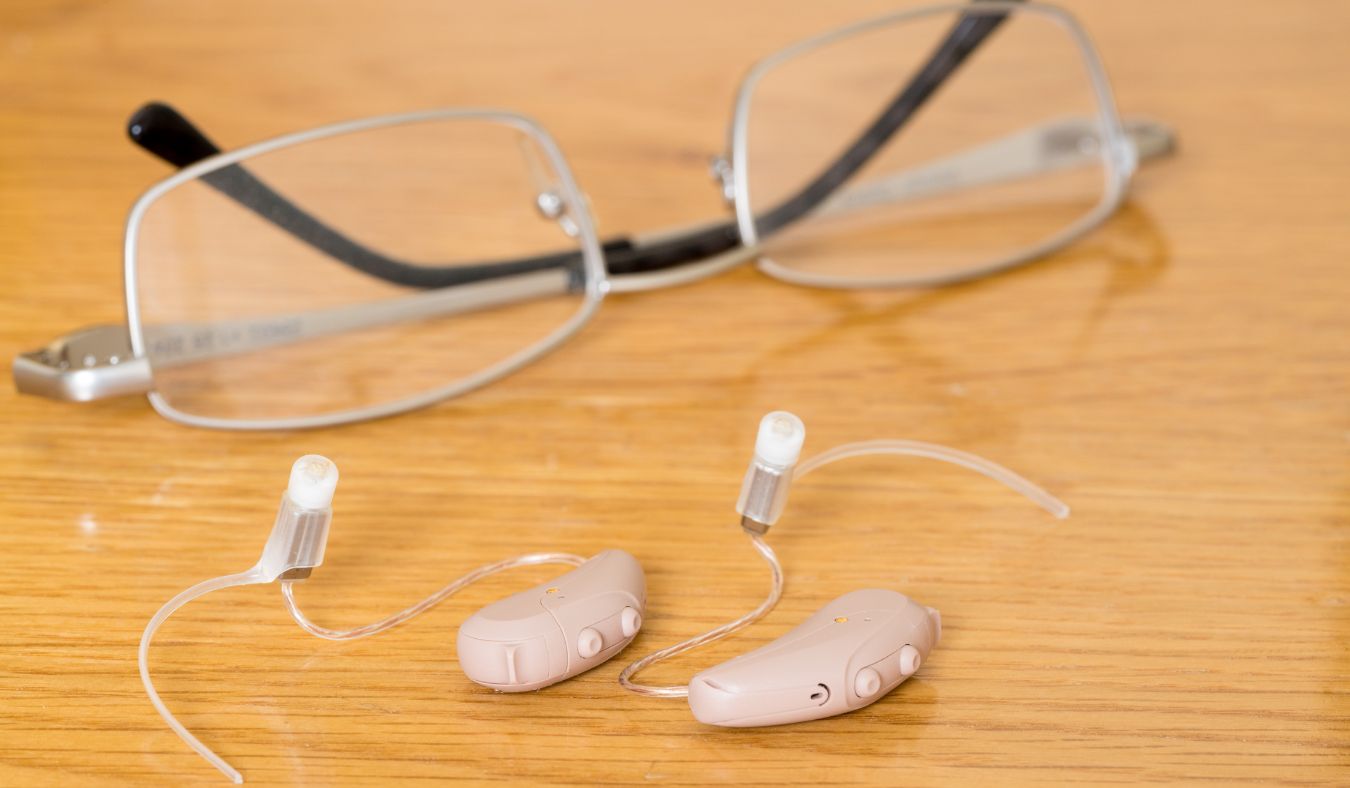The Impact of Hearing Aid Design on Wearer Comfort
When you’re choosing hearing aids, it’s easy to focus entirely

By: admin | February 18, 2025
When you think about hearing loss, you might first think about missing sounds – the birds singing, music playing or people talking. But the effects of hearing loss reach far beyond just sounds. They can touch almost every part of your daily life and change how you feel about yourself and your connections with others.
Picture sitting at a family dinner, trying to keep up with conversations happening all around you. As voices blend together and words become unclear, you might find yourself nodding along instead of joining in. Over time, these moments can lead to feeling left out or disconnected from the people you care about most.
We’re social beings – we need to connect with others to feel our best. When hearing loss makes these connections harder, it can affect your mood, your confidence and your overall sense of well-being. You might start turning down invitations or backing away from activities you once enjoyed, simply because communication becomes too difficult or tiring.
But here’s the important thing to remember, hearing loss doesn’t have to mean losing your connection to the world around you. Today, there are many ways to address hearing loss and maintain the active, social life you want. The first step is understanding how hearing loss affects not just your ears, but your whole self – including your mental health.
Hearing loss and mental health have a complex relationship. As your hearing ability decreases, feelings of isolation, frustration or even depression can surface. This is largely because we rely on hearing to connect with our surroundings and the people in them. When this connection is strained or cut off due to hearing loss, it can significantly affect your mental health.
Research has consistently shown a link between untreated hearing loss and increased feelings of anxiety, restlessness and sadness. It’s believed that the constant effort to understand conversations and keep up with social interactions can lead to these negative emotional states. So, maintaining good hearing health is not just about preserving your ability to hear, but also about protecting your mental well-being.
Hearing loss can greatly affect the way you interact daily with family, friends and coworkers. When you’re unable to hear properly, simple tasks like chatting with friends or participating in a work meeting can become stressful. It’s not just about missing out on words or phrases; it’s also about the energy and concentration required to fill in the gaps and make sense of partial information. This strain can lead to exhaustion and frustration, further exacerbating feelings of isolation.
Over time, this constant effort to keep up with conversations can make social interactions feel overwhelming, causing some people to withdraw from group settings or avoid conversations altogether. The emotional impact can be just as significant as the practical challenges, leading to a sense of disconnect from loved ones and colleagues. Misunderstandings can also become more common, affecting relationships and making it harder to fully engage in daily life. Addressing hearing loss isn’t just about improving hearing – it’s about maintaining confidence, connection and ease in communication.
Hearing loss can make understanding conversations in noisy environments like restaurants or parties nearly impossible, leading to feelings of exclusion and loneliness. It can also create misunderstandings and miscommunications, causing strain in relationships. The frustration of frequently asking others to repeat themselves or feeling left out of fast-moving conversations can make social situations exhausting, sometimes leading people to avoid them altogether. This can impact friendships, family dynamics and even professional interactions, as communication barriers become more pronounced.
However, these challenges often foster resilience and creative problem-solving skills among those experiencing hearing loss. They learn to adapt by relying more heavily on visual cues or using assistive technologies, showing that even amidst struggles, there are opportunities for growth and adaptation. Many develop strong observation skills, becoming more attuned to body language, facial expressions and context clues to fill in the gaps. Others find new ways to stay engaged, whether by advocating for their needs, seeking supportive environments or embracing technology that enhances communication. While hearing loss presents real obstacles, the ability to adapt and find solutions can lead to greater confidence and a renewed sense of connection.
Hearing loss, while primarily recognized for its impact on our ability to hear, also has a profound effect on social connections and emotional well-being. The diminished capacity to communicate effectively often leads to feelings of isolation and loneliness. These less discussed consequences are equally significant.
Depression is a serious mental health condition that affects millions of people worldwide, and research has shown that it may have a significant connection with hearing loss. Struggling to hear isn’t just about missing out on conversations or sounds around you. It can also lead to feelings of isolation and frustration which, over time, can contribute to depression.
This connection underscores the importance of addressing hearing loss promptly and effectively. Not only can treating hearing loss improve your ability to communicate, but it could also play a key role in supporting your overall mental health.
The impact of hearing loss on mental health is not limited to feelings of isolation or depression. Another side effect that often goes unnoticed is anxiety. As you struggle to keep up with conversations or misunderstand what’s being said, it can lead to a constant state of worry and stress.
This anxiety can manifest in various ways. You might find yourself avoiding social situations for fear of embarrassment or constantly second-guessing what you’ve heard. Recognizing this connection between hearing loss and anxiety can prompt necessary action towards better hearing health care. However, if left unaddressed, this anxiety could potentially exacerbate your hearing difficulties and further affect your quality of life.
Studies have suggested that untreated hearing loss may contribute to cognitive decline, including problems with memory and thinking skills. This could possibly be due to the increased mental effort required to understand speech when you’re dealing with hearing loss.
Have you ever considered the psychological stress that persistent hearing problems can cause? It’s an important aspect of hearing health that deserves our attention.
Persistent hearing problems can lead to a constant state of strain and tension. The ongoing effort to understand conversations and keep up with social interactions can be mentally exhausting, triggering psychological stress. This stress is not just fleeting; it lingers, affecting your mood, energy levels and overall quality of life.
In addition to this, the fear or anxiety of mishearing important information or misunderstanding conversations can further fuel this stress. Recognizing these challenges is the first step towards addressing them effectively with the help of an audiologist.
When it comes to maintaining both your hearing and mental health, timing is key. Acting quickly at the first signs of hearing loss can significantly improve your mental health outcomes.
Early intervention means getting help as soon as you notice changes in your hearing ability. It’s not about waiting for the problem to worsen or for your mental well-being to take a hit before seeking assistance. Instead, it’s about being proactive and reaching out to an audiologist who can provide appropriate solutions tailored for your needs.
By addressing potential issues sooner rather than later, you’re giving yourself the best chance at preserving not only your ability to hear but also maintaining an overall positive state of mind. This approach minimizes feelings of frustration or isolation that may arise from untreated hearing loss and reduces the likelihood of experiencing related mental health concerns such as anxiety or depression.
The support of loved ones can be invaluable for those experiencing hearing difficulties. Their understanding and encouragement help reduce feelings of isolation and frustration, making daily interactions less stressful. A strong support system fosters positivity and can also be a driving force in seeking professional help. When family and friends take the time to communicate effectively and show patience, it strengthens relationships and helps ease the emotional toll of hearing challenges.
Beyond emotional support, loved ones can play an active role when seeking treatment. Whether assisting with therapy exercises, attending consultations or simply reinforcing the importance of treatment, their involvement can improve outcomes. This shared effort not only makes managing hearing loss easier but also deepens connections through mutual understanding and collaboration.
Hearing loss affects more than just communication – it can take a toll on mental well-being. That’s why accessing mental health support is just as important as addressing hearing difficulties. Counseling, therapy and support groups can provide guidance and connection, helping individuals navigate feelings of frustration or isolation. Seeking help isn’t a sign of weakness but a step toward improving overall well-being, and mental health professionals are equipped to offer the understanding and support needed.
When you take steps to manage your hearing health properly, you’re also taking care of your emotional well-being. By ensuring that you can participate fully in conversations and social activities, you’re reducing feelings of isolation and frustration that can accompany hearing loss. Regular check-ups with an audiologist can help keep track of any changes in your hearing ability, allowing for timely interventions if necessary.
Additionally, using assistive devices like hearing aids or cochlear implants can significantly improve communication abilities, leading to less stress and anxiety in social situations. And remember – these tools aren’t just beneficial for those with severe or profound hearing loss. Even individuals with mild or moderate difficulties can benefit from using these devices.
Hearing loss isn’t just about sound – it’s about how you experience the world and connect with the people in it. Struggling to keep up with conversations can make social situations frustrating or exhausting, but it doesn’t have to lead to isolation. With the right support and solutions, you can stay engaged and involved in the moments that matter.
Addressing hearing loss means more than improving what you hear – it’s about maintaining confidence, relationships and overall well-being. Taking that first step toward better hearing can help you regain not just sounds, but the ease and enjoyment of everyday interactions.
At Davis Audiology, we are committed to providing comprehensive care that addresses not only your auditory health but also its impact on your mental wellness. With locations in Greenville, Simpsonville and Spartanburg, SC, our team is ready to assist you with personalized solutions tailored for your needs. Give us a call at (864) 810-6238 and let us guide you towards better hearing and improved mental health.

When you’re choosing hearing aids, it’s easy to focus entirely
By: admin | October 20, 2025

Summer heat affects hearing aids differently than you might expect. When
By: admin | July 29, 2025

Music plays different roles in people’s lives; it motivates you
By: admin | June 20, 2025
